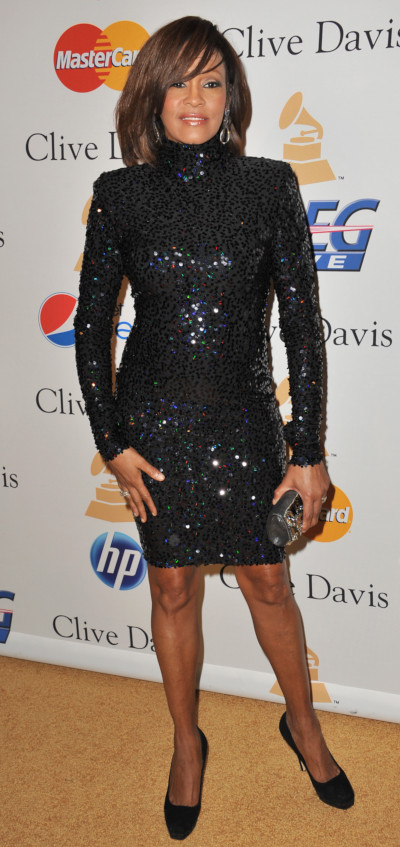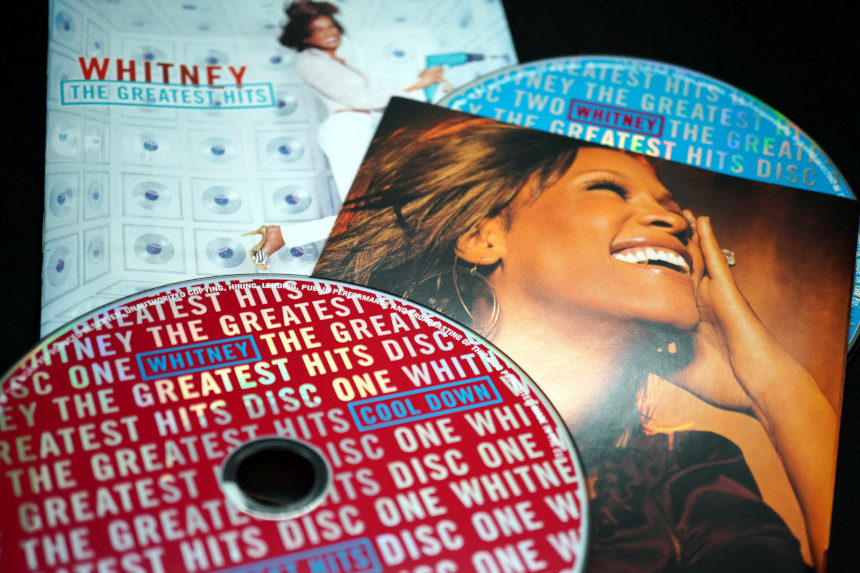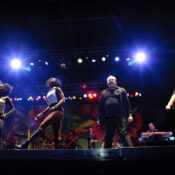Thirty years ago, the United States was at war. Iraq invaded and occupied Kuwait in August of 1990; the United States and a coalition of allies immediately mobilized. On January 17, 1991, the Gulf War commenced as airstrikes and naval-fired missiles targeted Iraqi forces in Kuwait. Super Bowl XXV was set to happen just ten days later; while some sponsors pulled contest-related ads that they felt would be inappropriate during a war footing, the game continued as scheduled. While the Giants’ close 20-19 victory over the Bills would be remembered for its closest-ever margin of victory and a blown field goal kick handing the Giants the win, one moment overshadowed the game. That was Whitney Houston’s performance of “The Star-Spangled Banner.”
Born in 1963, Houston was almost pre-destined for music greatness. Her mother was Grammy-winning gospel singer Cissy Houston, her cousin was superstar Dionne Warwick, and her godmother was Rock and Roll Hall of Famer Darlene Love. If that wasn’t enough, Aretha Franklin was her “honorary aunt,” having met her as a child on a recording studio trip with her mother. Houston was brought up singing in the church, but by age 15 she was doing background vocals for the likes of Chaka Khan. For a while, Houston detoured into modelling; she was the first black woman on the cover of Seventeen. She performed guest and duet spots on various records until her self-titled debut was ready to be released in 1985.
“Saving All My Love for You” (Uploaded to YouTube by Whitney Houston)
The album’s first single, “You Give Good Love,” went to #3, but the follow-up, “Saving All My Love for You,” hit #1 in both the States and the U.K. The next two singles from the album, “How Will I Know” and “The Greatest Love of All” also zoomed to #1. Whitney Houston earned the distinction of being the best-selling debut album for a solo artist at that time, eventually notching 13 million copies sold in the States. The next album, Whitney, only got bigger; it was the first album by a woman to debut at #1, and it came loaded with four future #1 singles: “I Want to Dance with Somebody (Who Loves Me),” “Didn’t We Almost Have It All,” “So Emotional,” and “Where Do Broken Hearts Go.” Her seven consecutive #1s broke records set by The Beatles and The Bee Gees.
By November of 1990, Houston had put out her third album, I’m Your Baby Tonight. The title track hit #1 in December; “All the Man That I Need” would do the same in February. It was during this period that Houston began to prepare to sing the Anthem. The run-up to war had been going on for months, with Operation: Desert Shield officially beginning in August; it would be re-named Desert Storm with the commencement of the bombing campaign.
Houston recorded her vocals in mid-January over music played by The Florida Orchestra. Yes, like many artists, Houston had a so-called safety copy in place. The Florida Orchestra was present on the field and was conducted by Jahja Ling. Despite the obvious quality of the track, there were those at the NFL that had objections to the song’s arrangement. Rickey Minor, Houston’s musical director, had changed the time signature of the song, which didn’t seem to draw much notice; however, the officials complained that the “harmonies were too different” (Minor went so far as to say that some NFL office personnel called Houston’s take “sacreligous.”) Houston flatly refused to change a thing. History would prove her right.
On January 27, Houston, bedecked in a white, patriotically accented ensemble, performed her version to almost 74,000 audience members in the stadium and an estimated additional 79.5 million viewers at home. The response was immediate. Within hours, Houston’s label was flooded with requests for the song to be made available for sale. Assessments of the game all included lavish praise for Houston. Maybe the uncertain national mood needed something. Maybe it’s just that Houston was that good. Whatever the reason, the song struck a chord.
“I Will Always Love You” (Uploaded to YouTube by Whitney Houston)

Rushed for release, the single hit #20 on the Hot 100, marking the first time that “The Star-Spangled Banner” was a Top 40 hit in addition to the National Anthem. Houston worked to have the single’s proceeds go to charity; it would benefit the American Red Cross Gulf Crisis Fund. The single moved 750,000 copies in the first eight days. Houston’s personal rocket ride was from far from finished. The following year, she would star in The Bodyguard with Kevin Costner. Her cover of Dolly Parton’s “I Will Always Love You” destroyed chart and sales records, holding the #1 spot across the end of 1992 and first two months of 1993, a total of 14 straight weeks. It’s still the best-selling single by a woman in history.
Amazingly, Houston’s version of the Anthem wasn’t finished. In the wake of 9/11 in 2001, Houston agreed to have the song re-released, with proceeds going to the New York Firefighters 9/11 Disaster Relief Fund and the New York Fraternal Order of Police. This time, the song went to #6. Today, it’s not uncommon to hear Houston’s version of the song played at sporting events where live singers aren’t available, or for rec and kids leagues that wouldn’t necessarily book performers.
Houston passed away in 2012, but her music lives on. The Guinness Book of World Records cites her as the most-awarded female singer of all time. She’s sold more than 200 million records. In 2020, she was inducted into the Rock and Roll Hall of Fame. It takes a rare talent to take a song that you hear countless times, at public events large and small, and imbue it with enough of a special spark to make people go out and buy it by the millions. Houston put her heart and soul into everything she sang, and in doing so, touched the heart and soul of the country.
Featured image: Kraft74 / Shutterstock
Become a Saturday Evening Post member and enjoy unlimited access. Subscribe now



